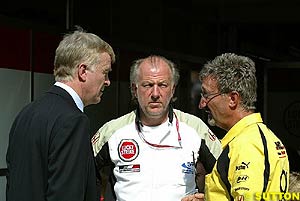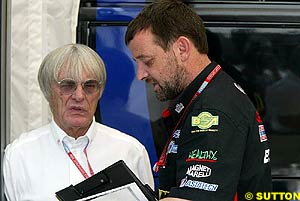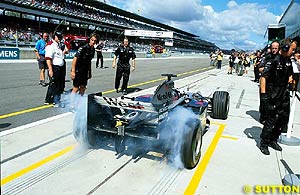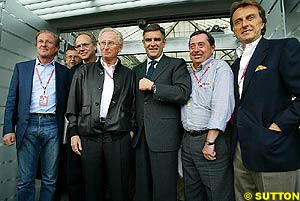
Atlas F1 GP Correspondent
After several, and less than fruitful, meetings with the team bosses, Formula One's ruling body - the FIA - decided to take a hard stance and impose radical changes to secure the future of the sport, with measures aimed at reducing costs and bringing back the excitement. The changes have received mixed reactions and only time will tell who is right and who isn't. Atlas F1's Will Gray takes a behind-the-scenes look at the announcement the FIA hope will change the face of Formula One
Mosley's announcement is already legendary. With a few extravagant exceptions like the end of radio communications and scrapping spare cars, the new rules, which included an imminent end to driver aids, were sensible - but it was the way in which the new regulations were announced that took everyone by surprise.
The original "revolutionary" meeting - at which the definition of a new points breakdown and the suggestion of a testing ban were the biggest decisions - proved a disappointment. But it was just a precursor to the real changes that would be seen over the winter.
In the absence of agreement on technical change at that October meeting, the decision was taken for the team bosses and the Technical Working Group to work together to find a solution. But it was clear before the discussions even began that there would never be a unanimous outcome.
The team bosses met again just before Christmas, without Mosley and Ecclestone to guide them. The 10 men managed to agree on just five minor changes for 2003 and the discussions were adjourned until the New Year, when Mosley called them in for what was dubbed a "crisis" meeting.
The failure of the previous meetings to reach an agreement for significant technical changes left the press relatively disinterested in the next gathering, which took place just one day after many of the British contingent had travelled to Barcelona for the BAR Honda launch.
Then Mosley dropped his bombshell.
If it had been left to the team bosses to agree on the changes, the press assumption that nothing of note would be decided would, most likely, have been spot on. But few who had witnessed the FIA's "revolutionary" October meeting end in disappointment had expected the latest Heathrow meeting to come to another stalemate.
But nobody reckoned on Mosley, a former lawyer, toughening his stance to create such significant changes to the sport. And, in a stern and uncompromising manner he placed his ideas on the table and told everyone that is the way it would be. No questions. No arguments.
Renault boss Flavio Briatore, speaking just two weeks after the meeting, admitted that Mosley's approach was the only way to achieve such sweeping change and admitted there was no way the team chiefs would have come to present such demand for radical reform.
"We cannot agree on anything," said a gleaming Briatore as he sat on a tall stool in bright yellow trousers answering questions at the launch of his team's latest car in Lucerne in Switzerland. "In a business, ideally we, as team managers, should meet and agree on a proposal to put to the FIA. But this is not a normal business. There is never unanimity, and it took Max to come in and say right, this is it, this is what we are doing. That's the way it works in Formula One."
Minardi boss Paul Stoddart insisted immediately after the meeting that there had been "unanimity" on the issues, but the story was very different from one insider involved in the meeting, who admitted "the usual suspects" had been voicing their concerns.
It has been well documented that Ron Dennis, the McLaren-Mercedes boss, was less than happy with the changes. But, speaking publicly last Friday for the first time since the changes were announced, he presented a different front - united with changes but disgruntled at the FIA for making them the way they did.
"I welcome any change that leads to an improvement for Formula One as a spectacle and I truly believe genuine racing will return to the sport this year," said Dennis. "We want everyone to be positive. I want to see Formula One being successful and I am passionate about it. It is that passion that has brought me to where I am today. Contrary to what some people may think we are in favour of anything that improved the sport as a spectacle but don't believe necessary to impose any regulation changes to achieve that."
His views, to a certain extent, have merit. But the brutal fact is that if the FIA had not taken a tough approach nothing would have been achieved - and the sport would most probably have been faced with another year of Ferrari domination.
Each team boss gave his technical knight a target and, refereed by the FIA technical delegate Charlie Whiting, they met at Heathrow the following Friday and several of the top bosses had ordered their men to fight to delay or destroy as many proposals as possible.
Just to add spice to the meeting several teams, including BAR Honda, had already run their cars in testing at the Circuit de Catalunya in Barcelona with the traction control turned off, just to prove an immediate ban on driver aids was feasible. They were successful.
David Richards, the team principal of BAR Honda, was one of the strongest backers of change, admitting he favours a low-tech driver-biased series to the extent that he almost re-named BAR 'Pure Racing'. But his man, Geoff Willis, the team's technical director, had a tough time fighting his cause.
"There was some hostile stuff going on and my guy was given a really hard time," said Richards. "We really support all these changes but there were certain factions who were far from happy. The Friday meeting eventually disbanded because there was no agreement."
According to insiders there was plenty of raised voices and table slamming amongst the technical bosses at their initial meeting. But there was no resolution. So, the following Tuesday, they tried again.
Renault technical director Mike Gascoyne admitted that both meetings were a tough ride. "Not being able to agree is not the right word," he joked. "There was a clear and frank exchange of views. There were one or two dissenting voices and I think you can guess who they were."
Eventually, the meeting concluded. And the results in the press release were almost as eye opening as the FIA's initial New Year law-laying meeting. The immediate conclusion was that the teams had got their own way. The FIA had backed down.
The ban on radio communications was ditched, so was the ban on spare cars. The rule limiting work on cars between qualifying and the race was limited, the ban on car to pits telemetry delayed for one season. But the major FIA breakthrough was a ban on driver aids, ahead of schedule, for the British Grand Prix in July.
"It's close to the start of the season but I think we've achieved what the FIA want to achieve in the given timescale," said Gascoyne a week after the final meeting. "When they announced the changes there were a lot of long faces among our technical staff who though they were all out of a job but that's not the case.
"We wanted to keep the traction control of course, because we had an advantage, but now we have to turn our attentions to making the other areas we are allowed to develop work so that we can make the car as easy as possible for the driver to control."
It happened exactly as had happened in the original Heathrow meeting, back in October. Prior to that, stories had 'leaked' that the FIA were planning to introduce extravagant driver-swapping in a bid to shake up the sport. That, of course, was never going to happen. It was bait. And the 10 piranhas in the club went for it.
This, however, is not the end of the story. After Mosley stated his new rules the Grand Prix World Championship manufacturers - Renault, BMW, DaimlerChrysler, Ford and Ferrari - spoke out against the changes with a unified statement insisting their breakaway series would go ahead unless the FIA's stance was modified. They have not yet given a unified response to the modifications made by the FIA since.
The stumbling block for the GPWC, according to Renault chairman Patrick Faure, is the requirement for engines to run for six races from 2006. Faure stated before the Technical Working Group meeting that the rule was unacceptable but the FIA still have not backed down.
BMW motorsport presented a general appraisal of the changes after the FIA modified their demands, but there now appears to be a split in opinions from the GPWC as Renault's French technical director Jean-Jacques His reiterated Faure's concerns following the final meeting.
"We are all for the one engine per meeting rule," said Renault's His. "It is a challenge but we are comfortable with it and it does bring down the costs. But asking us to design an engine for six races is not what the sport is about.
"It doesn't seem to be in the best interest of the sport and needs discussing in fine detail. It's like turning Formula One into endurance racing. Asking us to extend an engine's life from 400km to 900km is already a big step but going up to 2000km two or three times more difficult. It is a step too far."
For now, however, the FIA has achieved what everyone wanted. Costs have been cut and with an additional agreement apparently proposed by Dennis, not Formula One commercial rights holder Bernie Ecclestone, to re-distribute the wealth in the sport, the small teams are sure to survive to at least the end of the season. And above all it got Formula One back in the limelight. Now it is up to the teams to keep it there.
"This has taken Formula One back 20 years," was the initial cry from one member of the Grand Prix circus after FIA president Max Mosley stormed into the Heathrow Hilton and proved that the sport's governing body is more than prepared to live up to its new motto: "Zero Tolerance".
 The team bosses originally met with Mosley and Formula One commercial rights holder Bernie Ecclestone at the Heathrow Hilton soon after the season ended in October. Their agenda: to change the blueprint of the sport by bringing back excitement and reducing costs after a season of collapsing teams and Ferrari dominance left fans and sponsors walking away.
The team bosses originally met with Mosley and Formula One commercial rights holder Bernie Ecclestone at the Heathrow Hilton soon after the season ended in October. Their agenda: to change the blueprint of the sport by bringing back excitement and reducing costs after a season of collapsing teams and Ferrari dominance left fans and sponsors walking away.
 There were questions and there were arguments, of course - it is just Mosley was not in the mood to hear them. This was a businesslike approach to a problem that was ruining his and sidekick Bernie Ecclestone's business. It was just what was needed to kick things into action.
There were questions and there were arguments, of course - it is just Mosley was not in the mood to hear them. This was a businesslike approach to a problem that was ruining his and sidekick Bernie Ecclestone's business. It was just what was needed to kick things into action.
 The Heathrow meeting, of course, was not the end of the issue, however. The FIA presented dissenting team chiefs with a get-out clause. If they could prove that the regulation changes would not be cost efficient to introduce they would be thrown out - and so the Technical Working Group was called into battle.
The Heathrow meeting, of course, was not the end of the issue, however. The FIA presented dissenting team chiefs with a get-out clause. If they could prove that the regulation changes would not be cost efficient to introduce they would be thrown out - and so the Technical Working Group was called into battle.
 In fact, the FIA had got exactly what they wanted with minimum fuss. The ban on driver aids will brighten up the racing and reduce the costs of development. The radio and spare car bans were, effectively, a bargaining tool. A nice idea, but one that they ultimately knew would be thrown out.
In fact, the FIA had got exactly what they wanted with minimum fuss. The ban on driver aids will brighten up the racing and reduce the costs of development. The radio and spare car bans were, effectively, a bargaining tool. A nice idea, but one that they ultimately knew would be thrown out.
Please Contact Us for permission to republish this or any other material from Atlas F1.
|
Volume 9, Issue 5
Atlas F1 Special
Back to the Future: The FIASCO War
Articles
The FIA's Hard Stance: Zero Tolerance
2003 SuperStats: Winter Testing
Columns
The F1 Trivia Quiz
Off-Season Strokes
Elsewhere in Racing
The Weekly Grapevine
> Homepage |